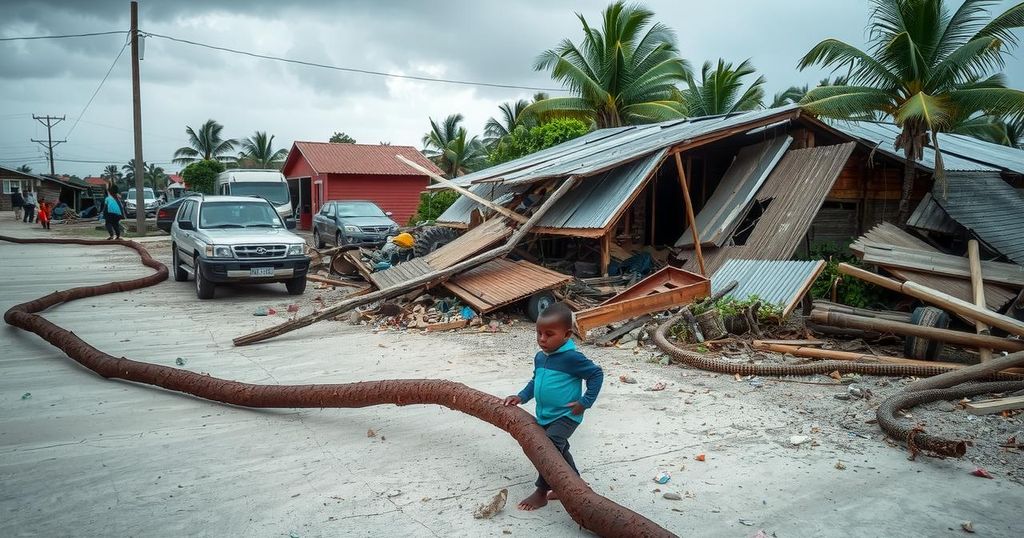Cyclone Chido Devastates Mozambique: Over 90,000 Children Affected

Cyclone Chido has severely impacted northern Mozambique, destroying over 35,000 homes and affecting more than 90,000 children. The cyclone compounded the region’s existing humanitarian crises, including conflict and disease outbreaks. UNICEF emphasizes the urgent need for support to address growing humanitarian needs, particularly for children, as the region braces for the consequences of this disaster.
Cyclone Chido Wreaks Havoc in Mozambique, Leaving 90,000 Children Affected
Cabo Delgado province in northern Mozambique has recently suffered extensive damage due to Cyclone Chido, which made landfall on December 17, 2024. The cyclone caused the destruction or damage of over 35,000 homes and impacted more than 90,000 children. In addition, at least 186 classrooms and 20 health facilities were severely affected, exacerbating an already critical humanitarian situation in the region.
Mary Louise Eagleton, the UNICEF Representative in Mozambique, stated, “Mozambique is considered one of the most affected countries in the world by climate change and children were already experiencing several life-threatening emergencies before Cyclone Chido, including conflict, drought, and disease outbreaks.” As the government, NGOs, and local partners mobilize Swiftly to respond, the challenges continue to pose serious risks for vulnerable populations.
Cyclone Chido primarily hit the city of Pemba, damaging civilian infrastructure, destroying roofs, and disrupting vital services such as electricity and communication. Cabo Delgado has been embroiled in conflict for over seven years, resulting in over 1.3 million internally displaced persons, of which approximately 80 percent are women and children.
The cyclone also affected neighboring Nampula and Niassa provinces, leaving more than 25,000 families without electricity and damaging essential water facilities. The region, currently grappling with a cholera outbreak, faces a heightened risk of worsening health crises in the wake of this natural disaster. With nearly 3.3 million people projected to experience food insecurity in Mozambique next year, the humanitarian challenges are set to escalate further.
UNICEF faces increased pressure to provide urgent assistance, with an estimated 4.8 million individuals, including 3.4 million children, in need of humanitarian support. The past decade has seen an alarming increase in the frequency of severe weather events across Eastern and Southern Africa, with Cyclone Chido standing as a stark reminder of the dangers ahead. UNICEF is requesting US$10 million urgently to aid in response efforts and counter the effects of Cyclone Chido and other ongoing emergencies.
Background
The impact of climate change has rendered Mozambique one of the most vulnerable countries in the world, particularly affecting children. The latest data reflects a concerning situation of increasing frequency and severity of extreme weather events, which have compounded existing challenges such as conflict, drought, and disease outbreaks. The recent Cyclone Chido significantly disrupts efforts to provide relief and support to those who have already suffered from prolonged humanitarian crises in Cabo Delgado and surrounding areas.
Quotes
“Mozambique is considered one of the most affected countries in the world by climate change and children were already experiencing several life-threatening emergencies before Cyclone Chido, including conflict, drought, and disease outbreaks.” – Mary Louise Eagleton, UNICEF Representative in Mozambique.
Proof to Links
There are no explicit links mentioned in the original article.
Conclusion
The devastation inflicted by Cyclone Chido on Mozambique, particularly in Cabo Delgado province, has severely impacted the lives of over 90,000 children and destroyed thousands of homes. With the region already facing numerous adversities, the cyclone has compounded the issues of displacement, food insecurity, and health crises. UNICEF and local stakeholders urgently call for support to address the immense humanitarian needs created by this disaster. Without timely intervention, the situation has the potential to deteriorate further, necessitating an increased humanitarian response to safeguard the affected populations.
Cyclone Chido has struck northern Mozambique during a period when the region is already beset by numerous challenges, including ongoing conflict, drought, and outbreaks of diseases. The cyclone has caused significant infrastructural damage, highlighting the country’s vulnerability to climate change impacts. This disaster underscores the critical need for sustained humanitarian efforts and support to address the growing challenges faced by the population, particularly children who are disproportionately affected by such calamities.
In conclusion, Cyclone Chido’s impact has significantly heightened the humanitarian crisis in Mozambique, affecting a large number of children and destroying vital infrastructure. The urgency for humanitarian assistance is critical as families face displacement, food insecurity, and potential health crises. It is imperative for local and international actors to coordinate efforts, ensuring swift and effective responses to mitigate further suffering among vulnerable populations.
Original Source: reliefweb.int






